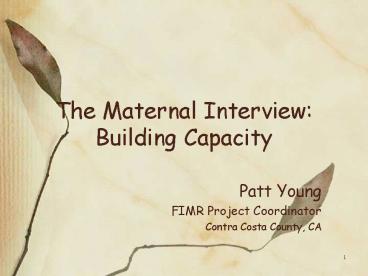The Maternal Interview: Building Capacity - PowerPoint PPT Presentation
1 / 26
Title:
The Maternal Interview: Building Capacity
Description:
'Maternal interviews give a voice to the disenfranchised in ... Anniversary reactions. 17. 18. Cross Cultural Expressions of Grief and Loss: When an Infant Dies ... – PowerPoint PPT presentation
Number of Views:48
Avg rating:3.0/5.0
Title: The Maternal Interview: Building Capacity
1
The Maternal Interview Building Capacity
- Patt Young
- FIMR Project Coordinator
- Contra Costa County, CA
2
Community Advantage
- Maternal interviews give a voice to the
disenfranchised in my community, those without
clout or power. FIMR provides a rare opportunity
for the providers in a community to hear from
the consumers. - Patt Young, FIMR Interviewer,
Alameda/Contra Costa Counties, CA
3
(No Transcript)
4
Interviewer should know how to
- Track, contact, engage mothers
- Review explain consent form
- Prepare to conduct interview
- Provide culturally sensitive bereavement support
during the interview - Listen and record, not interpret
- Conduct interview
5
Interviewer should know how to (cont)
- Maintain confidentiality
- Comply with public health safety codes
including reporting requirements - Handle difficult encounters maintain personal
safety - Screen for mental health concerns
- Avoid implications of mismanagement liability
- Refer to needed services when appropriate
6
Purpose of FIMR Maternal Interview
- To learn about mothers experiences
- To identify community assets deficits
- To convey mothers story to FIMR team
- To assess familys needs referrals
- To facilitate bereavement process
7
Building Referral Network
- Perinatal Service Providers
- Delivery Hospitals
- Case Management Programs
- Community Based Organizations
- Mortuaries
- Coroners
- Social Services
- Pregnant and Parenting Teen Programs
8
Qualities of a Successful Interviewer
- Culturally sensitive
- Supportive listener
- Believes in the FIMR methodology
- Comprehends FIMRs role in changing and improving
the community
9
Interview Preparation
- Maintaining confidentiality
- When interviewing is not recommended
- Reporting child abuse
- Interview consent form
- Locating mothers
10
The Art of Being Prepared
- Mental preparation
- Professional preparation
- Hints before and after
11
Why is it so hard?
- Challenges of the first call home visit
- Mothers want to talk.
- and tell the story of their childs life and
death.
12
Understanding the Grief Experience
- Factors Affecting Grief Experience
- Expressions of Grief
- Health Care Provider Responses at Time of Death
13
Tasks for Bereaved
- Understand components of grief
- Grieve
- Commemorate
14
All fetal and infant deaths can be considered
sudden and unexpected
- Pregnancies are supposed to be carried to term
- Children are not supposed to die before their
parents.
15
Factors Affecting a Families Grief Response
- Age of deceased and survivors
- Relationship to survivors
- Prior experience with death
- Faith foundation
- Family traditions and customs
- Historical background of cultural group
- Education
- Economic status
- Geographic region
16
Normal Grief Response
- Hostility and anger
- Depression
- Guilt
- Anxiety and fear
- Sadness, crying
- Mood swings
- Physical symptoms
- Disorganization, difficulties making decisions
- Anniversary reactions
17
(No Transcript)
18
Cross Cultural Expressions of Grief and Loss
When an Infant Dies
- FIMR Educational Bulletins include information
on - American Indian
- Chinese
- Muslim Families
- African American
- Latino
19
Questions Providers Can Ask to Assist the Bereaved
- I am so sorry for your loss. How can I help you?
- What are your traditions when an infant dies?
- Is there someone I can call for you?
- Has your family ever had this experience before?
How did they handle it? - Did you have a funeral service? Was it helpful?
20
Support
- Offer words of comfort and compassion in the
familys own language. - Translators may be needed.
- Refer parents to support systems, such as faith
community - Maintain clear communication with all family
members, respect family communication pattern - Reassure parents that their expressions of grief
and the intense feelings are accepted.
21
Words from Compassionate FriendsThe dos and
donts of working with bereaved families
- Don't try to find magic words that will take away
the pain. There aren't any. - A hug, a touch, and a simple "I'm so sorry" offer
real comfort and support. - The easy/hard job of listening to the bereaved.
22
Phrases to avoid
- Avoid saying, "I know how you feel." Appropriate
only if you also have had a child die. - Avoid saying "It was God's will" and using other
clichés that attempt to minimize or explain the
death. - Don't try to find something positive in the
child's death, such as, "At least you have other
children." There are no words that make it all
right that a child has died.
23
Words from Compassionate FriendsThe dos and
donts in working with bereaved families
- Parents with religious convictions may struggle
with God's role in this event. - Listen! Let mom express the anger, questions,
pain, disbelief, and guilt they may be
experiencing - There is no standard timetable for recovery.
24
Summarizing the home interview
- Methods are specific to your program
- Remember this is the voice of the mother, a
community member and a consumer
25
Take Care of Yourself
- Support each other as FIMR home interviewers
- Know your strengths and limitations
- Be aware of your reactions
- Take responsibility for your own needs
- Learn to receive as well as give
Adapted with permission from the California SIDS
Program A Practical Guide to the SIDS Home
Visit, 2001
26
May You be strengthened by yesterdays
rain, walk straight in tomorrows wind and
cherish each moment of the sun today." Ojibiwa
Prayer































